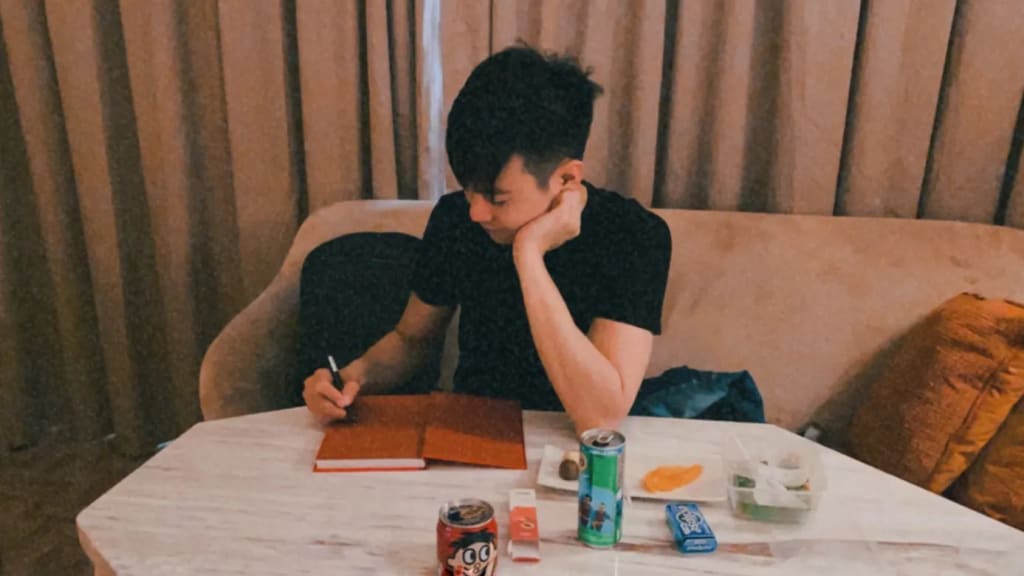
I look back on the first piece I ever wrote and I cringe.
I force myself to read it, however. I force myself to read it not because I enjoy self-induced pain—I've had enough of pain to last a lifetime, thank you very much—but because I think it's essential, as a writer, to look back on just how far you've come. I think it's essential for all aspiring artists to hold up, every once in a while, a brutally honest mirror and be our own self-appraisers, whether or not you like what you see within.
So, once a year, I re-read my first story.
-
My first story is titled 'CTE: The Case For Smarter Sparring.'
I wrote it when I was 22 and a fresh-faced student at University. I was still trying to be a fighter in those days, a professional mixed-martial-arts pugilist, believe it or not, and something about fighting professionally always bothered me.
Namely, the brain damage. Many of the fighters I admired came down, after they have retired and their glory days were long over, with a case of dementia pugilistica, better known scientifically as chronic traumatic encephalopathy, or CTE for short. It's a dreadful disease. As I wrote oh so long ago, the sufferers of this dread disease will end up having:
...trouble with their coordination and fine motor skills. At its early stages, being punch drunk may not seem like a huge deal. It could be brushed off as yet another cruel but normal affliction of old age — something to be endured. But it isn’t. The symptoms do not get better. On the contrary, they get progressively worse over time. Perhaps most insidiously, symptoms typically appear years after the initial brain trauma(s) occurred, and by then it is far too late.
As of 2018, it can only be diagnosed post-mortem with a brain tissue analysis. There is no known cure.
My knowledge of this affliction's existence was made doubly worse by the fact that I wanted to be a fighter. It was, therefore, a very real thing that could happen to me. It's one thing to know that a disease exists. It's quite another to know that you might be the one to catch it.
The more I read about this disease, the more terrified I became. I discovered, during my reading, that repeated subconcussive trauma (that is to say, blows to the head that are not damaging enough to cause unconsciousness) is the primary cause of this disease. And when I discovered this, my terror morphed into indignancy. I knew that the vast majority of the damage these fighters take did not come from their fights. A mixed-martial-arts fighter, even a particularly active one, will only have a maximum of thirty or forty bouts in their career. No, most of the damage these fighters take comes in the form of getting ready for the fight. That is to say, most of the damage these fighters take comes from sparring in the gym.
I thought of all the hard sparring sessions I have had, and how many times I was told to, when I was caught by a hard shot, to bite down on the mouthpiece and swing back just as hard. There was many a night, after a brutal sparring session, when I would go home and be unable to even switch on the lights in my room. My eyes would be that sensitive. My headaches would be so bad.
I would then sleep my headache off, only to return to the gym the very next day to spar hard all over again.
I thought and I thought and I became more and more indignant. "This disease," I thought, fuming. "More people should know about it! There is absolutely no reason why we should have hard sparring. We're not improving ourselves as martial artists. We're only doing irreversible damage to ourselves and others!"
My first story was born out of this indignancy. I was studying Communications in college, and a friend of mine contacted me to write a story for a magazine she was editing. She offered to pay me $40 for anything I could write that was related to contact sports. I accepted and, within the span of three hours, submitted the article on CTE.
To my surprise, she accepted it. It was my first time ever getting paid for my writing. I found that I liked it.
I submitted two more stories to the magazine. One was accepted, the other was turned down. But no matter. I had made a whopping $80 for two stories—and what's more, people were reading, actually reading, my stories! The words that were burning in my head were being printed onto paper and actually read. I started getting comments. Some of them were supportive, while others were critical. But I read and embraced them all. It was better, I figured, to write and be critiqued than to clam up and be ignored.
The magazine my friend was editing soon closed down, but by then, it was too late for me. Writing had become addictive for me, as addictive as fighting ever was.
-
I never did end up fighting professionally. Perhaps I had done a tad too much research on the effects of CTE...
But I did end up becoming a writer, albeit a semi-professional one. That is to say, I get paid for my words, although I do not get paid enough from them to quit my job and devote myself to writing full-time. But a man can dream...
I'm 28 now, and it has been nearly six years since I wrote that first story. In those six years, I have written a couple of dozen poems, more than three hundred essays and short stories, and two full-length novels of my own. My third is in the works. If you told me, while I was a young twenty-two-year-old writing my first story, that I would be where I am now, I would've called you crazy. Yet here we are now.
So yes, I think it's important, vitally important, that we as writers re-read our first pieces. There are two things we can learn from this experience.
The first, of course, is to track and discover just how much your style has evolved since then. It's a humbling experience, to re-read your early work. I was young then, inexperienced—and it showed. My sentences were stilted, my prose had little in the way of confidence. My structure was all over the place and I even got simple things like grammar and proper quotations wrong. I'm a better writer now, there can be no denying it. My first story is proof of this.
But the second is what most people miss out on, and that is to get the feel of yourself, back when you were writing that first story. What made you boot up your laptop, type your words down, and publish them for the world to see? Seeing your work on paper, what did it make you think? How did it make you feel?
Every time I re-read my first story, I am struck by the realization that I wrote because I wanted an outlet. There was something I wanted to say—nay, there was something I wanted to scream out—yet nobody would listen to me. So I wrote it down, that it may be discovered and read, not only at the time that I wrote it, but hopefully, if I wrote it well enough, in the years that are to come.
And, reading it now, I am once again struck by the same feeling. As I read the things that my twenty-two-year-old self had to say, I feel a sense of shame at the level of my writing, but I also feel, oddly enough, rejuvenated and refreshed.
I feel, deeply, the passion that my past self had for writing. He was so driven, this young fella, so excited, so full of belief that the words he typed down mattered, that the act of his writing would, in some small way, change the world for the better. I remember telling myself, as I was writing my first story, that should even one person read it and have their worldview altered, then the hours I spent in front of the keyboard would not have been wasted.
And I still believe it now, which is why I am writing this.
Remember, fellow writers, we all start somewhere. And sometimes, when you look back at your first story, at your first attempts at this ungainly craft called writing, you may cringe. You may feel ashamed. But you should read your first work anyway. You can learn much and more from it. Studying your first story will make you a better writer, yes. You can see, for yourself, just how far you have come, and still how much further you still have to go. But more than that, it will put you in the headspace of why you started writing in the first place. Your Reason For Writing, if you will.
And your reason for writing will keep you going, past the rejections, past the criticism, and past the time when it would make more sense than not to quit. And the writers who, despite it all, simply keep on writing?
They are the ones who make it.






Comments
There are no comments for this story
Be the first to respond and start the conversation.